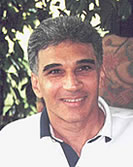For weeks you have been practicing and playing outstanding tennis. Bravo! You are now ready for match play. At the tournament you hear over the loudspeaker, "Mr. Outstanding Player now up on court two." Go get 'em, tiger! And you proceed to play a totally different game than the one you practiced. Confused and perplexed, you wonder why you cannot play the way you practiced.
The number one question that players ask me (outside of "how can I play like Roger Federer?") is "why can I not play my matches like I play in practice?" For years I have watched players completely fall apart in matches yet play extremely well in practice. This is not unusual and happens to just about everyone. To play matches exactly like you practice can take years to master, but here are three principles that can help you close the gap between your practice and your match play.
PRINCIPLE # 1 - ACCEPTING FAILURES
When practicing you generally accept your failures with a more relaxed mental attitude than when playing a match. When you make a mistake in practice it's not a calamity because you are just practicing. You casually and comfortably move on. No fear of consequences results in a relaxed mental attitude and more shots landing in the court, which leads to better play. In contrast, during match play if you miss one time you quickly feel the emotional sting and begin to tighten up. Fear of missing now results in anxious play and more shots missing the court, which leads to poorer play.
The solution of course is the Refocus Technique: "The next shot is more important than the last mistake." I should add to that "the next shot is more important than the last mistake" IN MATCH PLAY. You may be great at executing this mental attitude in practice, but you have not yet transferred this mental attitude to your match play. Here is a suggestion... win, lose or draw it's time to apply the Refocus Technique IN MATCH PLAY!
PRINCIPLE # 2 - BRING YOUR STROKES TO A SUBCONSCIOUS LEVEL
Often playing better in your match play is simply a matter of bringing your strokes in practice to an ultra-high level of subconscious and automatic play. What I'm telling you is lots and lots of practice - way beyond what you think is enough. Because of the pressure of match play your stroke production will always drop a notch or two. With this in mind you should practice relentlessly until you bring your practice game to an extremely high level. When you then play a match your strokes may drop a little but you will still execute at a high enough level to perform gallantly.
With my Tennis Warrior System I utilize this concept all the time when training a student to play more automatically and instinctively in their match play... it works! I call it "spontaneity through preparation!" (Editor's note: Tom lays this whole concept out clearly and lucidly in his audio CD "Training for Pressure Play" available at the end of this article.)
PRINCIPLE # 3 - LEARN TO ACTUALLY PLAY LIKE YOU PRACTICE
Now, read this carefully! In the morning you are in a practice match and moving the ball around waiting for the right shot to go for your winner. You are not over playing and you are making your opponent hit many, many balls. When you have an opportunity to go for a winner you take it, but until then you are patient like a true Tennis Warrior and you are working your opponent, not letting your opponent work you. Well done! Way to go!
In the afternoon you play a real league match. You now are really trying to win. This translates subconsciously into hitting the ball a little harder with the mindset of trying to win the point. You begin to make mistakes. You continue to go for a little more on your shots even when you are just hitting to your opponent because you are attempting to now WIN! You continue to make more mistakes while trying to WIN until finally you LOSE. You walk away in frustration thinking, "Why can't I play like I practice?"
The solution... To actually play like you practiced may help! In practice you were just trying to get the ball back and move your opponent around. Now all of a sudden in match play you are stepping it up a notch to WIN. Do you notice anything inconsistent about these two scenarios? To you, winning when you are playing a match is to do more with the ball than the way you practiced! Here is the short answer to solve this problem. Don't do this. PLAY LIKE YOU PRACTICED!
In conclusion, follow these three principles and you will begin to make that critical transition from practice to match-play.


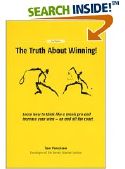
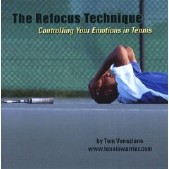
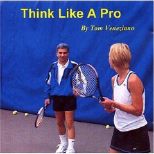
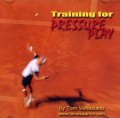



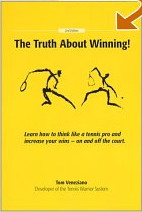
 You will join 13,000 other subscribers in receiving news of updates to the Tennis Server along with monthly tennis tips from tennis pro Tom Veneziano.
You will join 13,000 other subscribers in receiving news of updates to the Tennis Server along with monthly tennis tips from tennis pro Tom Veneziano. 